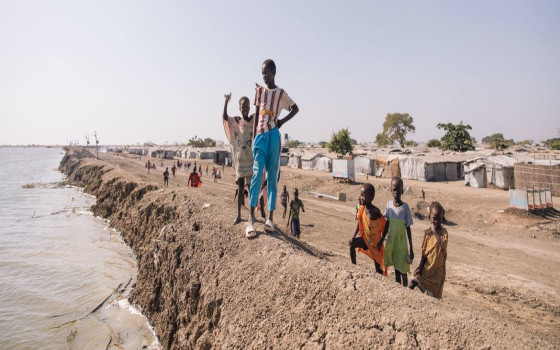
A UN committee identifies the names of government officials in southern Sudan who should be investigated

- Europe and Arabs
- Tuesday , 4 April 2023 17:23 PM GMT
Brussels: Europe and the Arabs
The United Nations Commission on Human Rights in South Sudan has released a report detailing how perpetrators of the country's most serious crimes, including large-scale attacks against civilians and extrajudicial killings, get away with it. According to the United Nations Bulletin, a copy of which we received via e-mail, it also stated that the 114-page report issued on Monday, entitled “The State of Impunity: Continuing Violence and Human Rights Violations in South Sudan,” is based on investigations conducted by the commission in 6 states. Southern Sudan and the neighboring region within 12 months.
The report identifies a number of government officials who should be criminally investigated for human rights abuses, including Unity State Governor Joseph Montuil and Lieutenant-General Thuy Chani Rit of the South Sudan People's Defense Forces for possible involvement in state-sanctioned extrajudicial killings.
The Commission has also identified Kutch County Commissioner Gordon Koang among those responsible for widespread attacks against civilians in Leer district, as well as other potential human rights abusers in Warrap State, Upper Nile State, northern parts of Jonglei State, and Equatoria states.
A summary of the report's key findings were submitted earlier this month to the Human Rights Council, but the report released today reflects in greater detail the commission's findings and locations of human rights violations over the past year.
“For several years, our findings have consistently shown that impunity for serious crimes is the main driver of violence and misery faced by civilians in South Sudan. That is why we have taken this step,” said Yasmin Sooka, Chair of the UN Commission on Human Rights in South Sudan*. To name more individuals who need to be criminally investigated and prosecuted for their role in gross human rights violations.
Breaking the grip of impunity
The Commission stressed that without addressing the issue of impunity, the rampant violence and horrific human rights violations and abuses in South Sudan, which include widespread attacks against civilians, including killings, rape, sexual slavery and other forms of sexual violence, as well as mass displacement, will not stop.
The Commission found that while the Government of South Sudan had announced special commissions of inquiry in several cases, none had led to any form of accountability, and the government and military personnel implicated in these serious crimes remained in office.
Committee member Andrew Clapham said the state continues to fail in its duty to protect civilians and ensure accountability for abuses. He called on the authorities to properly investigate alleged perpetrators of serious crimes, regardless of their rank or position, and to establish and strengthen justice mechanisms to hold them accountable.
“The grip of impunity can only be broken if national authorities recommit and abide by the values and promises contained in the peace agreement,” said Commissioner Barney Avako. “Political leaders are accountable to the people of South Sudan, and therefore must ensure that the civic space for dialogue is protected if I want my process of holding elections and drafting a constitution for the first time in the country to be credible and have a positive impact."
The report also assessed South Sudan's justice systems and initiatives, including the country's recent use of military courts and ad hoc investigations. The report touched on thematic human rights issues, including the use of children by armed forces and armed groups, conflict-related sexual violence, the economic-political context of human rights violations, and the near disappearance of civic space in the country.
* It is mentioned that the Commission on Human Rights in South Sudan is an independent body mandated by the Human Rights Council to investigate, determine facts and circumstances related to human rights violations and abuses in the country and report them. Its three members are not UN employees, do not receive remuneration for their work, and act independently as human rights experts.












No Comments Found